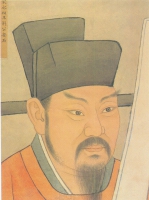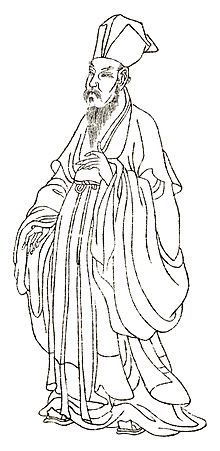| 姓: | 王 | ||
| 名: | 安石 | ||
| 字: | 介甫 | ||
| 网笔号: | 半山; 荊國公; 王文公; 王荊公 | ||
| 籍贯: | 臨川????阜嶺 | ||
| 今属: | 江西省撫州市臨川縣 | ||
阅读王安石 Wang Anshi在诗海的作品!!! | |||
王安石(1021年12月18日-1086年5月21日),字介甫,[a]號半山,臨川????阜嶺(今江西省撫州市臨川縣)人,北宋著名政治、文學家、思想,實官至司空、尚書左射、觀文殿大學士、鎮南軍節度使,封荊國公。身追贈為太傅,謚曰文。因而被世人稱之為“王荊公”、“王文公”。
王安石文思敏捷,被世稱為唐宋八大之一。除文學造詣外,王安石對傳統經學也有研究,創立在當時具有卓越影響力的學派——荊公新學,他的思想對宋明之季的經學學習産生極大的影響,在當時也獲得很多關註。雖然王安石主要修習儒學說,但是他秉持實務主義,從周禮、荀子、韓非子和商君書(商子)等其他經籍、論著中吸取經驗,世學界多因此結王安石所主持的熙寧變法而認為王安石傳承於法。除此之外,王安石對道教、佛教也有瞭解,留有多篇著述。歐陽修曾作詩“翰林風月三首,吏部文章二百年。老去自憐心尚在,來誰與子爭先”稱贊王安石。現有《臨川集》、《臨川集拾遺》等文集存世。
王安石在政治一途頗有所建樹,對宋代産生深遠的影響。他在慶二年考中進士,先於江蘇、浙江、安徽、河南等地為官,這二十年中他泛地接觸社會生活,對社會上的各種問題有比較深刻的認識。直至熙寧年間擔任宰相發達動改革,史稱“熙寧變法”或“王安石變法”。王安石的基本思想根植於不盲從一定的權威、不信奉一成不變的教條,進行改革時對現實有清醒的認識,以及正確的技術與計算。希望將“財政稅收大規模的商業化”。熙寧變法引起朝廷內部新派與保守派之間的激烈衝突,史稱“新舊爭”,最終在各種原因的阻隔下王安石所實施的變法基本失敗。此次變法在歷史上多被評價為立意良善但王安石本人能力不足而失敗,宋史學家漆俠提出變法成功和失敗的地方都值得垂鑒世。
宋政治、文學家。字介甫,晚號半山。撫州臨川(今屬江西)人,移居江陵(今南京)。其政治上主張“改易更革”,進行變法,遭失敗。安石為宋詩文革新運動的中堅人物,為唐宋古文八大之一。詩成就最高,今存一千五百三十首。多指陳現實,有感而。如《河北民》、《禿山》等。詠史之作,往往寓意深刻,如《商鞅》、《賈生》等。《明妃麯》二首,立意新穎,尤負盛名。退隱,詩歌轉為山光水色,其雄直峭勁、壯麗超逸而又深婉不迫的獨特詩風,為推動宋詩革新起積極作用。文存姓余余氏余姓余公余家余曰余姚余杭余云余道余将老篇,其議論性散文尤具特色如《答司馬諫議書》、《遊褒禪山記》等。其詞格調高峻,最為絶唱。有《臨川集》一百傳世。生平事跡見《宋史》三二七集。[王安石]
王安石(1021—1086)字介甫,晚號半山,臨川(今屬江西)人,慶二年(1042)
進士。在仁宗、英宗兩朝,他在許多地方擔任過地方官,也曾在中央部門任職,對於民
間情況、政治的弊病和國所面臨的危機有相當的瞭解,逐漸形成自己的一套政治、經
濟主張,曾在給仁宗皇帝的上書中提出變法的建議。神宗即位,面對外族壓迫、國
力虛弱、財用匱乏等一列嚴重問題,急欲找到出路,遂於熙寧二年(1069)起用時任
三司度支判官的王安石為參知政事,主持歷史上著名的熙寧變法。但他的一套激烈變革
的政策措施,既觸犯士大夫集以及富商豪紳的利益,又與封建官僚制度不相適應,
造成很多流弊,招致強有力的反對,起落。期退居江寧。在司馬光全廢除新法
不久,憂憤而卒。有《臨川集》。
王安石青年時代就有高度的政治熱情,以太平宰相自許,又以頑強的態度投入政
治爭,其理想决不是要做一個“文人”。在他三十多歲會見歐陽修時,歐陽修在贈詩
中比之為李白、韓愈這樣的文學家,他在酬答詩中卻說:“他日若能窺孟子,終身何敢
望韓公?”(《苕溪漁隱叢話》引《漫叟詩話》)在他看來,韓愈還是文人氣太重。他
對文學的看法,也是特強調其實用功能:
所謂文者,務為有補於世而已矣;所謂辭者,猶器之有刻鏤繪畫也。誠使巧且華,
不必適用;誠使適用,亦不必巧且華。要之,以適用為本,以刻鏤繪畫為之容而已。
(《上人書》)
這觀點同當時文學思想的主潮相一致。不過,王安石說的“適用”,偏重在具
實際的社會作用方面,而不像道學家偏重在道德說教,這是政治的本色。
由於這“務為有補於世”的文學觀念的支配和對現實的強烈關註,王安石的詩文
都與社會、政治或人生的實際問題貼得很緊。散文尤其突出。像《上仁宗皇帝言事書》、
《答司馬諫議書》等名文,本是與變法有關的政論而非文學作品,且不像歐陽修同類文
章那樣講究文,暫且不論,即使像《讀孟君傳》、《書刺客傳》、《傷仲永》這
樣的小品文,都包涵有很實際的用意,而不是為外表電表現人生情趣、文學才思。
如《讀孟君傳》談的是怎樣算真正“得士”的問題,《傷仲永》談的是天賦不
可依恃,學習尤其重要。甚至像《遊褒禪山記》這歷史來重視辭和情趣的遊記類散文,
也用近半的篇幅,引伸討論一個哲理性的問題:無論做什麽事情,要達到超乎庸常的
境界,都需要具有非凡的意志、付出超常的努力。
在王安石詩歌中,也存在類似的情況。一部分作品是直接反映現實社會問題的,如
《感事》、《兼併》、《省兵》、《收????》、《河北民》等,大多作於他任地方官時,
達他對時政的批評和他的政治理想。另一部分作品,則古喻今,或題揮,
明作者的政治觀念或人生觀念,如《商鞅》,以“今人未可非商鞅,商鞅能令政必行”,
強調建立有效的國機器的重要;《孟子》“何妨舉世嫌迂闊,故有斯人慰寂寥”,
現他在政治上固執己見的態度。此外如《賈生》、《漢武帝》、《桃源行》、《明
妃麯》等,大類似。不過,同散文的情況不一樣的是,除這一類觀念性比較強的作
品以外,王安石(特是在他脫離政治舞臺的時期)還寫有許多偏重於抒情的作品。
與梅堯臣、舜欽、歐陽修等人推崇和效仿韓愈不同,王安石詩受韓愈的影響很少,
而是非常敬重杜甫,泛吸收中晚唐詩的特長。他曾編過《老杜詩集》,在
《杜甫畫像》中寫道:“吾觀少陵詩,為與元氣侔,力能排天斡九地,壯顔毅色不可
求。”杜甫在宋代逐漸受到高度重視,宋詩逐漸杜甫的方向靠攏,可以說是以王安石
為起點的。另外,他也編過《唐百詩選》,收的多是不為人重視的中小詩人的作品,
顯然他有神采丰采情采采烈博收的意識。在此基礎上,他的詩形成以語言精煉而圓熟、意境清麗而
含蓄為主要特點的風格。
王安石的詩對語言的錘煉十分講究,善於不留痕跡地化用前人的詞彙和意象。傳
說《泊船瓜洲》中“春風又緑江南岸”一句中的“緑”字,改十次確定下來。其
實,把形容詞“緑”用為動詞的寫法,不但李白早已有“東風已緑瀛洲草”之句(《侍
從宜春苑……》),其他人也反使用過多次,但王安石這句最為親切自然而形象鮮明,
能現出江南風光的喜人之處,所以為人們所熟知。又如《暮春》詩中“雨花紅半墮,
煙樹碧相依”,是受杜甫“曉看紅濕處,花重錦官城”(《春夜喜雨》)一聯的啓,
但並不覺得是套用前人的。還有《書湖陰先生壁》“一水護田將緑繞,兩山排闥送青
來”,人認為是用史書中的材料為對仗,極贊賞,但他確實用得很巧,不顯得吃力。
另一方面,王安石雖然經常憑藉博的書本知識方便地化用前人語,但他並不總是在
搬弄學問,他也常常通過細膩的觀察,捕捉生動的意象,以平易的語言現自己內心的
情緒、感受。像“北山輸緑漲橫陂,直塹塘灧灧時。細數落花因坐久,緩尋芳草得歸
遲”(《北山》),二句對得很工整,讀起來卻很自然,“細數”、“緩尋”既烘托
蕭散曠逸、從容不迫的神態,又暗涵一種百般無聊的閑愁。一般來說,王安石不把
經過仔細揣摩、推敲的個典故、語詞用得很顯眼,而是把這精巧的語言同全詩意脈
的自然流動融成一,正如葉夢得《石林詩話》所說,看上去“見舒閑容與之態”,
但“字字細考之,若經櫽括權衡者,其用意亦深刻矣”。
王安石詩常有謝靈運及中晚唐詩那清麗的風,黃庭堅謂之“雅麗精絶,脫去流
俗”(《苕溪漁隱叢話》引)。像《歲晚》:
月映林塘澹,風涵笑語涼。俯窺憐緑淨,小立伫幽香。攜幼尋新菂,扶衰坐野航。
延緣久未已,歲晚惜流光。
詩中的景物顯得清幽雅潔,呈現超脫於世俗之外的美,而詩人的心便流連於此。讀
這樣詩,我們會想到謝靈運的山水詩,但王安石沒有他那樣的貴族式的孤傲;想到大
十才子或賈島一派的寫景詩,但王安石沒有他們那寒苦。實際上,王安石這一類詩是
帶有某孤獨和清高意味的,是他對此不作強化的現,保持着心態的平衡,因而
在語言上,這一類詩也寫得比較諧調。
這裏已經涉及王安石詩的另一特點,即現的含蓄。為更好地說明它,我們再舉
一個例子:
杖藜緣塹穿橋,誰與高共寂寥?伫立東崗一搔首,冷衰草暮迢迢。(《寄蔡
天啓》)
杜甫晚年的詩,常把自我的形象孤零零地置於肅殺的色中(如《登高》),以
現心境的悲涼,王安石這首詩與之有些相像,包括聲律的頓挫也有些相似。但王安石作
些淡化的處理,譬如詩中用“誰”來代替自己,避免以廣阔的背景造成情緒的擴張,
同時也避說明或暗示情緒的具內涵,因而留給人們的是一種既蕭索又蒼涼、不可實
指的悵惆情懷。造成這詩境原因很多。一方面,王安石個性倔強,一生經風波,在
受到挫時,內心的不平總是要流露出來;但另一方面,不僅他的人生驗很雜,不
易說清楚,而且,在宋代重理智的文化氛圍中,作為有過重要政治地位的大人物,詩中
個人情感現得過於強烈,會被認為是一種幼稚的誇張,所以他還是用比較抑的、
含蓄藴藉的方式來現。另外像《南浦》:“南浦隨花去,舟路已迷。暗香無覓處,
日落畫橋西。”也是一種不知因何而起的惘然若失的情懷。但不管怎麽說,在宋代詩人
中,王安石的詩歌情感,已經是比較濃厚而不偏於平淡的。透過清麗而含蓄的意境,
詩人的內心隱痛還是可以感受到的。
王安石以其博的學識、圓熟的語言技巧、自然含蓄而又精巧凝煉的風格,建立
宋詩的一,來以黃庭堅為首的江西詩派,受他的影響不小。他們以才學為詩的偏,
也與王安石有些關係。
(中國文學史,章培恆 駱玉明,youth掃校)
Wang Anshi [wǎŋ ánʂɨ̌]; Chinese: 王安石; December 8, 1021 – May 21, 1086), courtesy name Jiefu (Chinese: 介甫), was a Chinese politician, poet and prose writer during the Song dynasty. He served as chancellor who attempted major and controversial socioeconomic reforms known as the New Policies. These reforms constituted the core concepts of the Song-Dynasty Reformists, in contrast to their rivals, the Conservatives, led by the Chancellor Sima Guang.
Wang Anshi's ideas are usually analyzed in terms of the influence the Rites of Zhou or Legalism had on him. His economic reforms included increase currency circulation, breaking up of private monopolies, and early forms of government regulation and social welfare. His military reforms expanded the use of local militias and his government reforms expanded the civil service examination system and attempted to suppress nepotism in government. Although successful for a while, he eventually fell out of favor of the emperor.
Background
During the Song Dynasty, the unprecedented development of large estates, whose owners managed to evade paying their share of taxes, resulted in an increasingly heavy burden of taxation on commoners. The drop in state revenues, a succession of budget deficits, and widespread inflation prompted the Emperor Shenzong of Song to seek advice from Wang.
Early career
Wang Anshi came from a family of imperial scholars (進士 Jìnshì) and was placed fourth in the imperial exam of 1042. He spent the first twenty years of his career in the regional government of the lower Yangtze region. During this period, he gained practical experience in local governance. This experience guided his analysis in formulating solutions to revitalize the ailing Song society.
Major reform
Wang believed that the state has the responsibility to provide for its people the essentials for a decent living standard: "The state should take the entire management of commerce, industry, and agriculture into its own hands, with a view to succoring the working classes and preventing them from being ground into the dust by the rich."
Wang came to power as 2nd privy councilor in 1069. It was there that he introduced and promulgated his reform policy (xin fa 新法). There were three main components to this policy: 1) state finance and trade, 2) defense and social order, and 3) education and improving of governance. Some of the finance reforms included paying cash for labor in place of corvee labor, increase the supply of copper coins, improve management of trade, direct government loan to farmers during planting seasons and to be repaid at harvest. He believed that foundation of the state rests on the well being of the common people. To limit speculation and eliminate private monopolies, he initiated price control and regulated wages and set up pensions for the aged and unemployed. The state also began to institute public orphanages, hospitals, dispensaries, hospices, cemeteries, and reserve granaries.
The military reform centered on a new institution of the baojia system or organized households. This was done to ensure collective responsibility in society and was later used to strengthen local defense. He also proposed the creation of systems to breed military horses, the more efficient manufacture of weapons and training of the militia.
To improve education and government, he sought to break down the barrier between clerical and official careers as well as improving their supervision to prevent connections being used for personal gain. Tests in law, military affairs and medicine were added to the examination system, with mathematics added in 1104. The National Academy was transformed into a real school rather than simply a holding place for officials waiting for appointments. However, there was deep-seated resistance to the education reforms as it hurt bureaucrats coming in under the old system.
Wang’s downfall
Although Wang had the alliance of such prominent court figures as Shen Kuo, imperial scholar-officials such as Su Dongpo and Ouyang Xiu bitterly opposed these reforms on the grounds of tradition. They believed Wang's reforms were against the moral fundamentals of the Two Emperors and would therefore prevent the Song from experiencing the prosperity and peace of the ancients. The tide tilted in favor of the conservatives due to renewed foreign conflict. He was even temporarily removed from power and imprisoned in 1075.[citation needed]
Like many Chinese officials of the era, Wang's career experienced many reversals, but the beginning of the end came in 1074. A famine in northern China drove many farmers off their lands. Their circumstances were made worse by the debts they had incurred from the seasonal loans granted under Wang’s reform initiatives. Local officials insisted on collecting on the loans as the farmers were leaving their land. This crisis was depicted as being Wang’s fault. The empress dowager was also an opponent of Wang. Wang wanted to resign, but the emperor still supported him, giving him high honors and an appointment to Jiangning (present-day Nanjing.)
He was recalled by the emperor the following year, but now he was seen as vulnerable and was openly attacked from groups of conservatives. Wang returned to Nanjing, which he preferred to Kaifeng. He wrote and engaged in scholarship through to his death in 1086.
With Shenzong's death in 1085, Wang was ousted and the New Policies were rolled back - some temporarily, some permanently.
Poet
In addition to his political achievements, Wang Anshi was a noted poet. He wrote poems in the shi form, modeled on those of Du Fu. He was later ranked number seven among the Eight Great Prose Masters of the Tang and Song (唐宋八大). He was an adherent of the Classical Prose Movement championed by Han Yu and Liu Zongyuan, first and second of the Eight Masters of the Tang and Song respectively. His poetry often included social themes along with the traditional observations of nature.
Poems
A well-known man-of-letters, Wang Anshi produced many outstanding essays and poems. Lines from one of his most famous pieces:
春風又緑江南岸, | Green in the spring winds |
One of eight famous literati of Tang-Song period, Wang Anshi was known for writing with succinctness and profundity. He laid stress on literature's social function and that writings should serve a purpose. His essays "A Visit to Baochan Mountain" and "In Reply to Official Censor Sima's Letter" are widely read by posterity.
Legacy
Chinese politicians and historians have continued to look back on the reforms of Wang Anshi as either principled and measured or misguided and disastrous.
The twentieth-century Chinese warlord Yan Xishan cited the reforms of Wang Anshi to justify his use of a limited form of local democracy in Shanxi. Yan believed that the focus and intent of Wang's reforms was to strengthen the Song dynasty by persuading ordinary Chinese to give the dynasty their active support, instead of merely serving it. The system of "democratic" government that Yan justified via the philosophy of Wang Anshi was mostly focused on improving Yan's own popularity without holding any real power, and never became an effective alternative to military dictatorship. On the other hand, the popular scholar Lin Yutang cast Wang as the equivalent of communist totalitarian government in his biography of Wang's adversary Su Dongpo.
See also
- ^ hence referred to as Wáng Jīnggōng 王荊公
- ^ hence referred to as Wáng Wéngōng 王文公
- ^ D.B. Boulger (1881). History of China. pp. 388–.
- ^ Man and the universe. Japan. Siberia. China. Carmelite House. 1907. pp. 771–.
- ^ Patricia Buckley Ebrey, Paul Jakov Smith 2016 p.237. State Power in China, 900-1325. https://books.google.com/books?id=9SpADAAAQBAJ&pg=PA237
- ^ Mote ch. 6
- ^ Nourse, Mary A. 1944. A Short History of the Chinese, 3rd edition. P.136
- ^ "Wang Anshi | Chinese author and political reformer | Britannica.com". britannica.com. Retrieved 2015-10-23.
- ^ Mote p. 139
- ^ "Ethics of China 7 BC To 1279 by Sanderson Beck | Song Dynasty Renaissance 960-1279". san.beck.org. Retrieved 2015-10-23.
- ^ Mote p. 140
- ^ Mote p. 141
- ^ Mote p. 141-42
- ^ Jaroslav Průšek and Zbigniew Słupski, eds., Dictionary of Oriental Literatures: East Asia (Charles Tuttle, 1978): 192.
- ^ Gillin 42
- ^ Yutang Lin. Gay Genius: The Life and Times of Su Tungpo. New York: John Day, 1947; rpr. Hesperides 2008 ISBN 978-1-4437-2217-9.
Works cited
- Mote, F.W. (1999). Imperial China: 900-1800. Harvard University Press. pp. 122, 138–142.
- Gillin, Donald G. Warlord: Yen Hsi-shan in Shansi Province 1911–1949. Princeton, New Jersey: Princeton University Press. 1967. LCCN 66-14308
Further reading
- Anderson, Gregory E., To Change China: A Tale of Three Reformers", Asia Pacific: Perspectives, 1:1 (2001).

